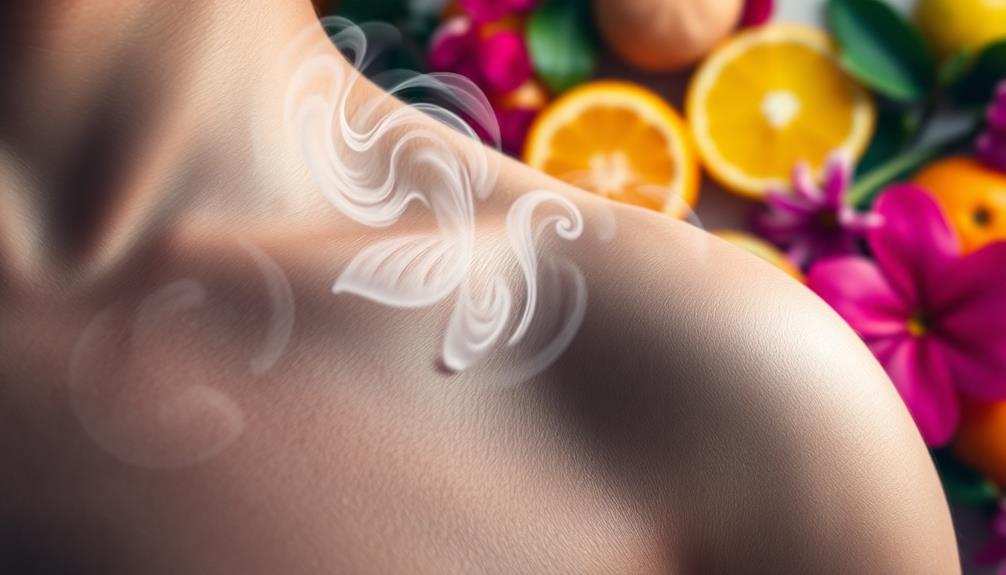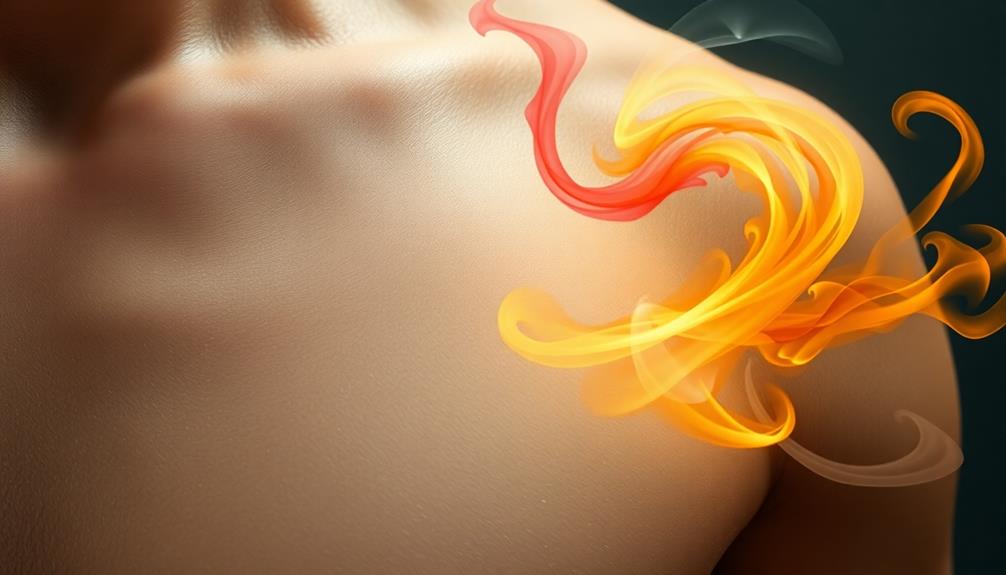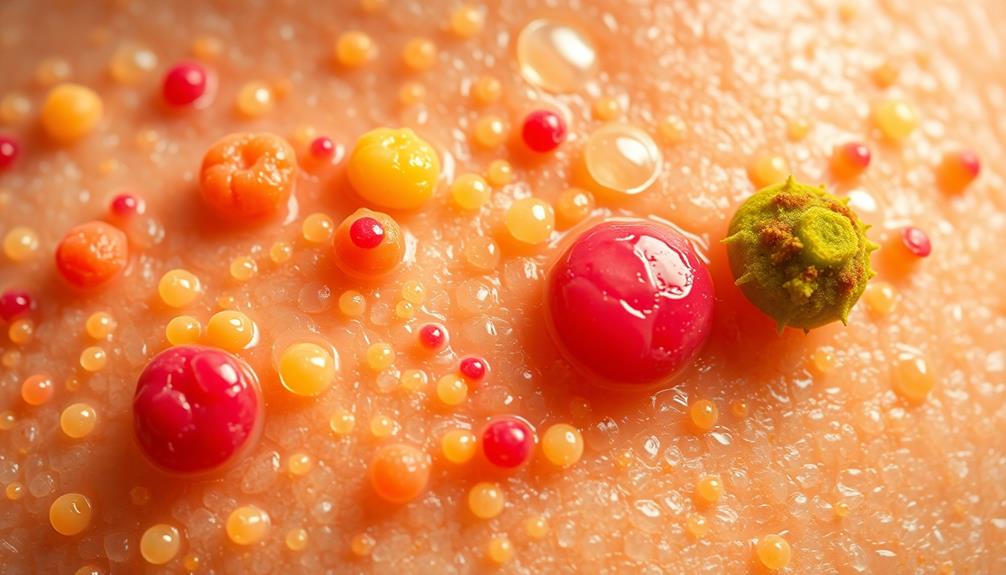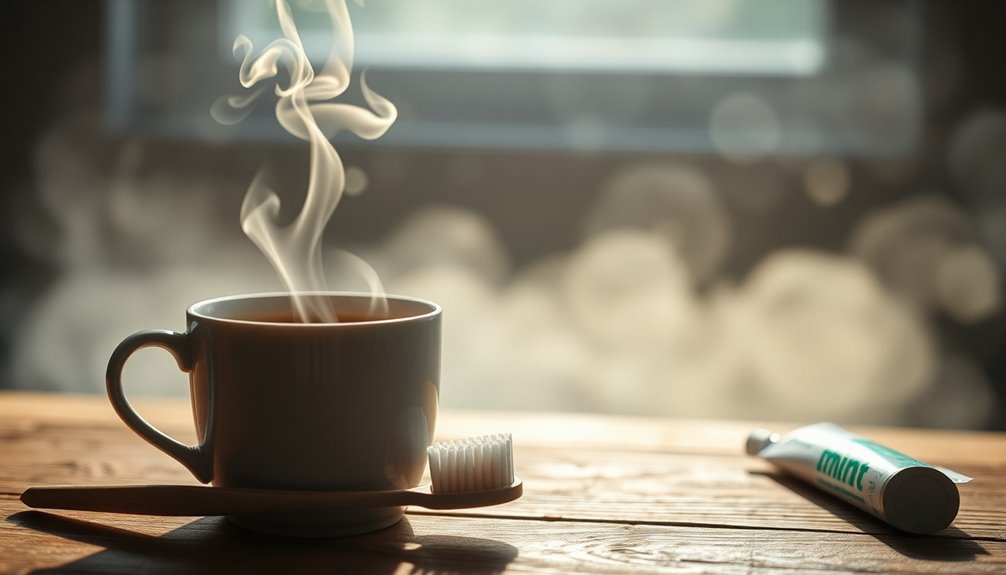Body odor can smell quite different from person to person. It might be sweet, sour, or even tangy! This variety comes from how your unique sweat mixes with the bacteria on your skin. For instance, areas like your armpits and feet often have stronger odors. When you exercise or feel stressed, you sweat more, which can make the smell more intense. Foods like garlic and onions can also change your scent. If your body odor suddenly changes, it might be worth checking in with a doctor. Stick around, and you'll discover even more fascinating details about body odor!
Key Takeaways
- Body odor can vary significantly, with scents described as sweet, sour, or tangy depending on individual microbiota and sweat composition.
- The smell intensifies when sweat from apocrine glands interacts with skin bacteria, producing distinct odoriferous compounds.
- Diet, particularly the consumption of sulfur-rich foods like garlic, can amplify body odor intensity.
- Areas prone to sweating, such as armpits and feet, typically exhibit stronger odors due to higher bacterial activity.
- Aging can lead to the production of 2-Nonenal, resulting in a characteristic "old person smell."
Introduction

Body odor is a natural part of human biology, but its varied scents can be surprising. You might notice that body odor can smell sweet, sour, or even onion-like. This difference happens because of your skin's unique microbiota and sweat composition.
When you sweat, the liquid itself is odorless. However, once it meets the bacteria on your skin, it breaks down into compounds that create distinct smells.
Body odor is most noticeable in areas like your armpits, groin, feet, and behind your ears. These spots contain apocrine glands, which produce the sweat that bacteria love to break down.
Your diet plays a big role too! Eating foods rich in sulfur, like garlic and onions, can ramp up your body odor.
Hormonal changes, especially during puberty, can also lead to a stronger smell. As your apocrine glands become more active, they produce protein-rich sweat, giving bacteria even more to work with.
Understanding these factors can help you manage body odor better and keep your confidence up!
Description of the Smell

The smell of body odor can be surprisingly diverse, with each person's scent reflecting their unique biology. Your body odor might've a sweet, sour, or even tangy smell. This variation comes from your individual microbiota and sweat composition.
Bacteria break down your sweat, producing thioalcohol compounds that create different odors. For some, this can result in a fruity aroma, while for others, it might smell more like garlic or onions.
Certain areas of your body, like the armpits and feet, tend to have stronger smells due to more sweat and bacteria. If you eat sulfur-rich foods, like garlic or cruciferous vegetables, you might notice a more intense body odor.
Aging changes your scent too. As you get older, the compound 2-Nonenal can start to build up, leading to a distinct greasy or grassy smell, often called "old person smell."
Source and Composition

Many factors contribute to the source and composition of body odor, primarily stemming from the interaction between sweat and the bacteria on your skin. When you sweat, the liquid itself is odorless. However, once it mixes with your skin flora, things change! Bacteria break down the sweat, leading to different smells based on the composition of those sweat components.
Your body has two types of glands: eccrine and apocrine. The apocrine glands, which kick in after puberty, produce odoriferous steroids and unsaturated fatty acids. These compounds mix with specific bacteria on your skin, like Corynebacterium and Staphylococcus haemolyticus, creating unique smells.
Men often have a rancid or cheese-like scent, while women might notice a fruity or onion-like smell.
Genetic factors and dietary choices also play a role. What you eat can influence the type of bacteria on your skin, which ultimately shapes your body odor.
Typical Scenarios or Environments

Different scenarios and environments can significantly influence your body odor, often amplifying or altering the scents produced by your skin's bacteria.
For example, when you're exercising, your sweat production increases. This sweat mixes with skin bacteria, leading to a stronger body odor. You might notice that after a workout, you smell more musky due to the apocrine glands working overtime.
Stress-induced situations can also change how you smell. When you're anxious, your body releases more sweat, which can create a noticeable scent. The stronger odor often comes from the same apocrine glands that respond to physical activity.
Humidity plays a big role too. In hot and humid environments, sweat doesn't evaporate as easily, allowing bacteria to thrive. This can lead to even more pungent body odor.
Emotional or Cultural Associations

Body odor often carries deep emotional and cultural significance, shaping how you perceive yourself and how others perceive you. Your body odor can evoke strong emotional responses. You might associate certain smells with comfort or familiarity, while others may bring feelings of aversion based on your experiences and cultural backgrounds.
In many cultures, pleasant odors are linked to health and attractiveness. This connection influences your social interactions and even mate selection. On the flip side, unpleasant odors can lead to stigmatization and social isolation.
Body odor preferences vary significantly between cultures. Some cultures favor specific scents, seeing them as markers of hygiene and desirability. Additionally, certain body odors, like those produced during stress or fear, serve as social signals. They can impact group dynamics and elicit empathetic responses from those close to you.
Your perception of body odor is shaped by cultural norms around cleanliness and fragrance. The global deodorant market reflects this emphasis, highlighting the importance of managing body odor as part of personal identity.
Health or Safety Considerations

Understanding the cultural significance of body odor can illuminate its potential health implications. Body odor can change for many reasons, and a sudden change in body scent might signal underlying health conditions. For instance, if you notice a fruity smell, it could indicate diabetes, while an ammonia-like odor might suggest kidney issues.
Additionally, emotional states can influence body odor, as stress or anxiety may lead to increased sweating and changes in scent, impacting social interactions and personal relationships. If you're experiencing excessive sweating, known as hyperhidrosis, that could lead to stronger body odor and may point to other health problems effective communication strategies.
If you find that you have persistent body odor, even with good hygiene practices, it's wise to seek medical advice. This is especially important if there's foul-smelling discharge from places like your navel or ears. Regular medical check-ups can help you identify any health-related causes of body odor. Early intervention is key for managing any serious conditions.
In some cases, treatments like botulinum toxin may help reduce excessive sweating, improving your body odor. Remember, taking these steps not only helps you feel fresher but also keeps your health in check.
Final Thoughts

Navigating the complexities of body odor can be challenging, but it's essential to remember that it's a normal part of being human. Your body odor can change based on various factors, like genetics, foods you eat, and hormonal changes.
Different bacteria on your skin break down sweat, creating unique smells that can be sweet, sour, or even onion-like.
If you've noticed a strong body odor, think about what you've been eating. Foods like garlic and cruciferous vegetables can lead to more potent smells.
Hormonal changes during puberty or menstruation can also intensify your body odor, making it smell different than usual.
Sometimes, specific medical conditions, such as diabetes or hyperhidrosis, can alter how you smell. If you notice an unusual change, it might be a good idea to consult a doctor.
Frequently Asked Questions
Can You Smell Your Own Bad Body Odor?
You might struggle to smell your own bad body odor because your brain gets desensitized to familiar scents. It's easier for you to notice it in others, especially when hygiene and diet play a role.
How Do I Know My Natural Body Smell?
To know your natural body smell, pay attention to your scent after a shower or workout. Notice how your diet and hygiene affect it, and consider factors like stress or hormonal changes that can alter it.
How Do You Know if You Smell Bad to Others?
You might notice signs like feedback from friends, discomfort in close spaces, or reactions from others. If your clothes smell after activity, it's a cue to check your hygiene and consider adjustments.
What Does a Body Smell Like?
You might notice that your body has a unique scent influenced by factors like diet, hygiene, and genetics. Depending on these, you could smell sweet, sour, or even tangy, reflecting your individual biology. This natural aroma can vary based on physical activity, stress levels, or even hormone fluctuations, making it as dynamic as your daily routine. Some people might use perfumes or deodorants to mask or enhance their scent, aiming for that elusive ‘1 million fragrance description‘—a term often associated with an idealized or luxurious scent profile. However, no amount of product can completely erase the uniqueness of your personal scent signature.









